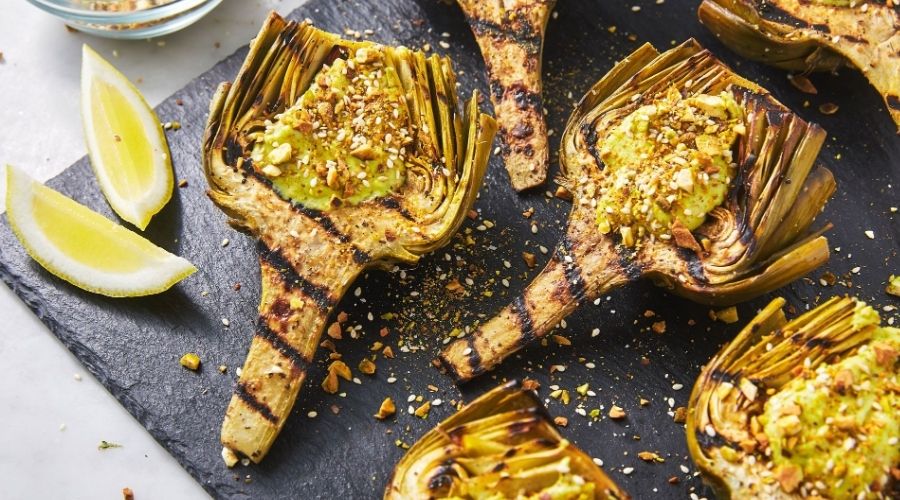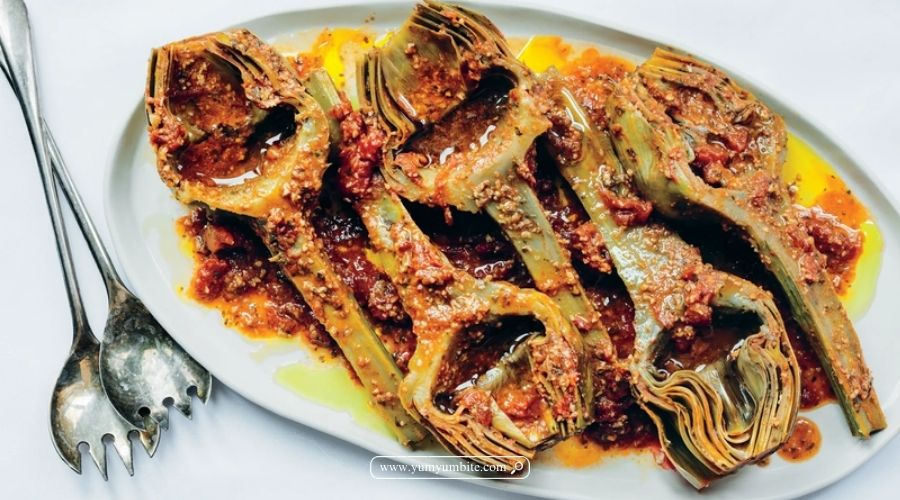Artichokes are a delicious and nutritious addition to any meal, but cooking them can sometimes leave you with leftovers.
Whether you’ve prepared a big batch for a gathering or simply cooked a few for a healthy snack, knowing how to store cooked artichokes properly is essential for preserving their flavor and texture.
In this article, we’ll explore the best methods for storing cooked artichokes, so you can enjoy their unique taste and health benefits even after the initial meal. From refrigeration to freezing, we’ve got you covered!
Why Storing Cooked Artichokes Properly Matters
Storing cooked artichokes properly is crucial for several reasons.
First and foremost, it helps maintain their flavor and texture, ensuring that they remain enjoyable to eat even after a few days.
Artichokes, like many vegetables, can lose their taste and develop an undesirable texture if not stored correctly.
Additionally, proper storage plays a vital role in food safety. Cooked artichokes can harbor bacteria if left at room temperature for too long, leading to potential foodborne illnesses.
By refrigerating or freezing them promptly, you can significantly reduce this risk.
Furthermore, understanding how to store cooked artichokes allows you to minimize food waste, making the most of your culinary efforts.
Leftovers can be a delightful part of meal planning, providing convenient options for future meals.
Ultimately, knowing how to store cooked artichokes properly not only enhances your dining experience but also contributes to healthier eating habits and sustainable practices in the kitchen.
How to Properly Store Cooked Artichokes for Maximum Flavor

Storing cooked artichokes properly is essential for preserving their taste, texture, and safety. Here’s a comprehensive guide to help you keep your artichokes fresh and delicious.
Allow to Cool
Before storing, let the cooked artichokes cool down to room temperature. This step is crucial to prevent condensation in storage containers, which can lead to spoilage.
Choose the Right Storage Container
Select an airtight container or a resealable plastic bag for storage. Glass containers are ideal as they don’t retain odors and are easy to clean.
If using a plastic bag, try to remove as much air as possible before sealing.
Refrigeration
- Short-Term Storage: For short-term use, store cooked artichokes in the refrigerator. They can last up to 3-5 days when properly stored.
- Temperature: Ensure your refrigerator is set to 40°F (4°C) or below to keep the artichokes safe and fresh.
Freezing
Long-Term Storage: If you want to keep cooked artichokes for an extended period, freezing is your best option. They can last up to 10-12 months in the freezer.
Preparation for Freezing:
- Cut the artichokes into quarters or halves for easier storage.
- Blanch them briefly in boiling water for about 2-3 minutes to preserve color and texture.
- Immediately transfer them to an ice bath to halt the cooking process.
Pack for Freezing: Once cooled, drain the artichokes and pack them in airtight freezer bags or containers. Label with the date for reference.
Thawing and Reheating
- Thawing: When ready to use frozen artichokes, transfer them to the refrigerator for several hours or overnight to thaw. For quicker thawing, you can use the microwave on a low setting.
- Reheating: Reheat in a skillet, steamer, or microwave until warmed through. You can also incorporate them into recipes like salads, pasta dishes, or dips.
Tips for Best Results
- Avoid Overcooking: When preparing artichokes, avoid overcooking, as this can affect their texture during storage.
- Keep in Mind Flavor Absorption: Artichokes can absorb odors from other foods, so store them away from strong-smelling items in the refrigerator.
- Use Clean Utensils: Always use clean utensils when handling cooked artichokes to prevent cross-contamination.
By following these guidelines, you can ensure that your cooked artichokes remain fresh and delicious for future meals, reducing waste and maximizing your culinary efforts.
Enjoy your artichokes in a variety of dishes while savoring their delightful flavor!
What to Look for While Storing Cooked Artichokes
When storing cooked artichokes, there are several important factors to consider to ensure they remain fresh, safe, and flavorful.
Here’s what to look for:
Cooling Time
- Cool Completely: Ensure the cooked artichokes have cooled completely to room temperature before storing. This helps prevent condensation inside the storage container, which can lead to spoilage.
Storage Container
- Airtight Options: Use airtight containers or resealable plastic bags to keep out moisture and air. Glass containers are often preferable because they don’t retain odors.
- Size Matters: Choose containers that fit the amount of artichokes you have, as excess space can lead to air exposure and potential spoilage.
Refrigeration Conditions
- Temperature Check: Store cooked artichokes in a refrigerator set to 40°F (4°C) or below. This is crucial for slowing bacterial growth.
- Location: Place them on a shelf rather than in the door, as the temperature can fluctuate more there.
Freezing Considerations
- Preparation for Freezing: If you’re freezing artichokes, look for signs of freshness before blanching. Only freeze artichokes that are in good condition.
- Packaging: Ensure that frozen artichokes are packed tightly in airtight bags or containers with as much air removed as possible.
Usage Timeline
- Labeling: Always label your storage containers with the date of storage. This helps you keep track of freshness and avoid consuming spoiled food.
- Timeframe Awareness: Be mindful of the storage time—cooked artichokes can typically be refrigerated for 3-5 days and frozen for up to 10-12 months.
Cross-Contamination Prevention
- Clean Utensils: Use clean utensils when handling artichokes to avoid introducing bacteria.
- Separation from Raw Foods: Store cooked artichokes separately from raw foods to prevent cross-contamination.
By paying attention to these factors, you can ensure that your cooked artichokes are stored safely and effectively, allowing you to enjoy their deliciousness for days or even months to come!
How to Tell If Cooked Artichokes Are Bad After Storing

Knowing how to identify spoiled cooked artichokes is essential for food safety and ensuring you enjoy the best flavor and texture.
Here are some key signs to look for:
1. Visual Inspection
- Discoloration: Fresh cooked artichokes should have a vibrant color. If you notice any darkening, browning, or unusual spots, it may indicate spoilage.
- Mold Growth: Any signs of mold, whether fuzzy or slimy patches, mean the artichokes should be discarded immediately.
2. Texture Check
- Sliminess: Fresh cooked artichokes have a firm texture. If they feel slimy or excessively soft, it’s a strong indication that they are no longer safe to eat.
- Dryness: While some drying can occur over time, if the artichokes are excessively shriveled or dried out, they may not be palatable.
3. Smell Test
- Off Odors: Cooked artichokes should have a mild, pleasant aroma. If they emit a sour, rancid, or otherwise unpleasant smell, it’s a clear sign they have gone bad.
4. Taste Test
- First Impressions: If the artichokes look and smell acceptable but you’re still unsure, take a small taste. If the flavor is off, bitter, or sour, it’s best to err on the side of caution and discard them.
5. Storage Time
- Check the Timeline: Remember that cooked artichokes should ideally be consumed within 3-5 days when refrigerated and within 10-12 months when frozen. If they’ve been stored longer than these timeframes, it’s safer to throw them away.
By keeping an eye out for these signs, you can ensure that your cooked artichokes remain safe and enjoyable to eat.
Always prioritize safety and quality when it comes to food storage!
1. How long can I store cooked artichokes in the refrigerator?
You can store cooked artichokes in the refrigerator for 3-5 days. Make sure they are in an airtight container to maintain freshness.
2. Can I freeze cooked artichokes?
Yes, you can freeze cooked artichokes! They can last in the freezer for 10-12 months. Just be sure to blanch them first and store them in airtight freezer bags or containers.
3. Should I let cooked artichokes cool before storing them?
Absolutely! Allowing cooked artichokes to cool to room temperature before storing them helps prevent condensation inside the storage container, which can lead to spoilage.
4. What’s the best way to reheat frozen cooked artichokes?
To reheat frozen cooked artichokes, thaw them in the refrigerator overnight or use the microwave on a low setting. You can then reheat them in a skillet or steamer until warmed through.
5. How can I tell if cooked artichokes have gone bad?
Look for signs of spoilage such as discoloration, mold, sliminess, or off odors. If they taste sour or bitter, it’s best to discard them.
6. Can I store cooked artichokes with other foods?
It’s best to store cooked artichokes separately from strong-smelling foods to prevent odor absorption. Always use clean utensils to avoid cross-contamination.
7. Is it necessary to blanch artichokes before freezing?
Yes, blanching cooked artichokes briefly before freezing helps preserve their color, flavor, and texture. It’s a crucial step for maintaining quality during storage.
Conclusion
Storing cooked artichokes doesn’t have to be a challenge. With the right techniques, you can maintain their delicious flavor and nutritional value for days to come.
Whether you opt for refrigeration or freezing, make sure to follow the guidelines we’ve outlined to ensure your artichokes stay fresh and tasty.
So the next time you have leftover cooked artichokes, you can savor them again without worry. Enjoy your culinary adventures with this versatile vegetable!
References
- https://www.chicagotribune.com/1985/12/05/dos-and-donts-of-cooking-artichokes/
- https://thecrosslegacy.com/artichokes/
- https://www.reddit.com/r/AskCulinary/comments/1e9jup/best_way_to_store_artichokes_for_a_few_days/
- https://www.quora.com/I-purchased-an-artichoke-for-the-first-time-at-the-store-today-because-it-looked-so-interesting-What-am-I-supposed-to-do-with-it-now
- https://www.reddit.com/r/AskCulinary/comments/1baj1iu/keeping_artichokes_fresh_in_a_vase/


